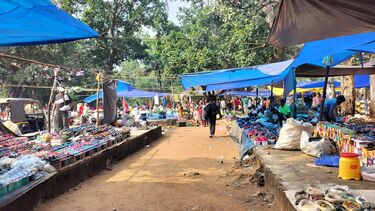Climate-resilient post-harvest market systems
We are working to understand how healthy foods can be made more accessible in ways that are affordable, equitable and climate resilient.

With the world facing a perfect storm of increasing urbanisation, dietary transitions and climate breakdown, there is an urgent need to understand how healthy foods can be made more accessible in ways that are affordable, equitable and climate resilient.
However, despite the importance of markets and associated supply chains for the distribution of healthy foods around the world (including in both high-income and low- and middle-income countries), the vast majority of research into food systems resilience has focused on agricultural production - neglecting the diversity of critical processes that operate downstream of the farmgate.
This theme aims to develop an interdisciplinary hub of researchers consolidating the crucial ‘middle’: processes operating downstream of ‘the farm’ but upstream of ‘the fork’. The theme aims to provide a space to discuss and explore how innovative postharvest infrastructures, technologies and policies can enhance climate-resilient access to nutritious foods amongst nutritionally insecure communities (in low and middle-income countries [LMICs] and high-income countries [HICs]), utilizing leverage points such as reducing food loss and waste, strengthening food safety and hygiene, improving the efficiency of distribution logistics, and enhancing the equity of food systems and decision-making processes in terms of gender, class and ethnicity.
The theme aims to develop both hard and soft spaces, e.g., a monthly meeting with a mix of internal and external seminar speakers, ‘troubleshooting sessions’ where colleagues workshop solutions to research-related problems, one-slide introductory presentations from new theme members, discussions on upcoming funding calls. A Google Space will also be established and maintained to enable discussions, including relevant publications and funding calls.
Key projects
- Five year study funded by the Bill & Melinda Gates Foundation aiming to understand the ways in which rural communities in India can gain better access to nutrient-dense foods (i.e., fruits, vegetables and animal-source proteins) through the improved functioning, equity and climate-resilience of food markets. The project features Prof Bhavani Shankar, Dr Gregory Cooper, Dr Anjali Purushotham, Dr Martin Watts and Shriya Bajaj at Sheffield
- NutriShed: Two year study funded by the Innovative Methods and Metrics for Agriculture and Nutrition Actions (IMMANA) programme, aiming to understand the origins and seasonal variations in nutrient-dense food flows into two urban areas in Ghana. The project features Dr Robert Akparibo, Prof Bhavani Shankar and Dr Gregory Cooper at Sheffield, and is a collaborative project with the ºÚÁϳԹÏÍø of Ghana, Accra
- Climateflation: A new 2.5 year study funded by UKRI investigating the impact that climate-related extreme weather has had on UK food supplies and quantifying the possible future impacts as the world warms further. The project is a multi-institute collaboration with the ºÚÁϳԹÏÍø of Aberdeen, London School of Hygiene and Tropical Medicine, Barcelona Supercomputing Centre, The Energy and Climate Intelligence Unit and The Food Foundation, with the project featuring Dr Megan Blake, Dr Beth Armstrong and Dr Neil Boyle at Sheffield.
Key contact
If you would like to be added to the theme’s mailing list, please do reach out to Dr Gregory Cooper.


